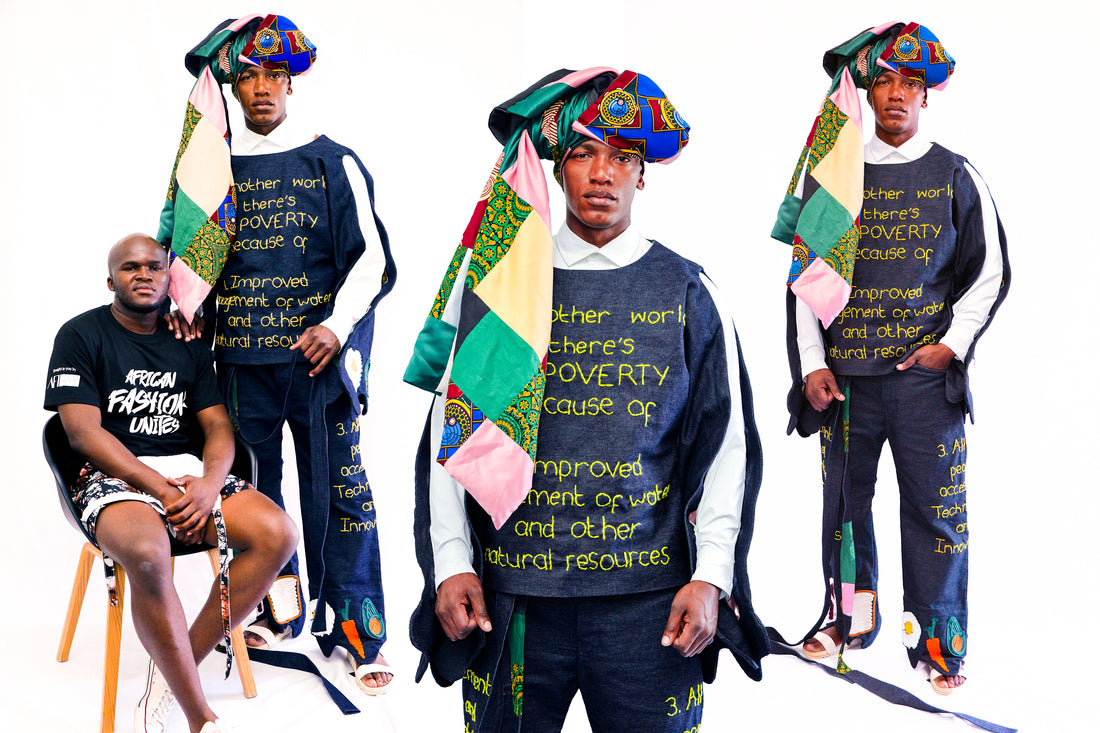
Articles from MARS uses fashion as a medium for social change
Share
Meet Kgotsofalo Given Monyamate, a designer using fashion to fight poverty
Articles from MARS: A Purpose-Driven Fashion Brand
By Ranji Mangcu
Through his gender non-specific label, Articles from MARS, AFI Fastrack 2023 finalist, Kgotsofalo Given Monyamate uses fashion as a medium for his anti-poverty manifesto. Monyamate describes Articles From MARS as a user-centred brand that seeks to address all four pillars of sustainability – human, social, economic, and environmental.
At first glance, the‘Out of this World’ theme of this year’s Hollywoodbets Durban July, seemed somewhat distant from this mandate. Monyamate, however, took this in stride. He used the theme as an opportunity to introduce a messenger from a faraway world – one where the human and environmental dilemmas of our earthly reality don’t apply.
Monyamate’s denim two-piece won first prize in the “Classic Racewear Male” category of the Durban July Raceday Fashion Competition. The ensemble was animated by bright yellow text stitched into the deep blue of the denim, as well as embroidered food items along the cuffs, imagining a food-secure world unlike our own. Putting sustainable production into practice, the ensemble had detachable sleeves, and incorporated off-cut material into a quilted lining.
AFI: It has now been a few weeks since the Durban July. How are you feeling about the challenge and that your garment won Classic Raceday for Men?
KM: I was excited about the brief for this challenge. I had never imagined participating in the Durban July, especially at this stage of my career. From the onset, I intended to conquer this challenge. While the journey was a rollercoaster ride, it was a learning curve in design and presentation, thanks to the expertise of our judges. I am proud of how my look came out. I believe it met the brief of the challenge, while adhering to the principles that Articles from MARS holds dear. I looked forward to unveiling it to the world, and I hope it was evocative as I intended it to be.
AFI: Some of the critiques were quite vigorous and I can imagine that it was a shock to the system. Would you say you’ve grown in how you receive critique, between the beginning of the programme and now?
KM: A shock to the system, indeed! I would say yes. I have grown in terms of how I receive critique. I recognized the judges for their expertise. I am so glad that I did.
AFI: How do you believe your piece either followed, improved upon, or intentionally deviated from the traditions of the Durban July?
KM: My piece supported Durban July tradition by being colourful and adhering to the theme. It intentionally deviated from the tradition by being made from denim, and comprising garments and accessories that can be worn at casual events. It also deviates by combining different prints and fabrics (African and Western) to create what has been to me a striking look that was worth the labour.
AFI: How did you find the experience of balancing your brand ethos with the theme? Was it an easy marriage to make?
KM: Oh, I love design challenges! It is hard to say whether it was easy or difficult to marry my brand ethos with the theme. Like all briefs I have had thus far, it takes time to finally produce a sufficient response through research and brainstorming.
AFI: What is the most valuable thing you’ve learned through the AFI Fastrack programme thus far?
KM: To be confident in your work and ensure that this translates into professional presentations. In the same breath, respect your work and your brand by treating every relevant presentation or discussion 'like it is your last'.
AFI: Many South African creatives have lamented the lack of infrastructure in place to effectively support South African creative industries. What is the importance of programmes such as AFI Fastrack in the uncertain, often emotionally taxing creative landscape of South Africa?
KM: Programmes like AFI Fastrack add to the tools that designers need to stand on their own. They enable them to better know, define and communicate their brand identity. Furthermore, they expose designers to worlds that are hard to infiltrate, exposing their work to an audience that would be otherwise difficult to reach. They allow you to gain insight into what it takes to survive in the local industry. How to tackle challenges, network, manage your finances and so much more. It is also worth mentioning that in the instance that a programme financially invests in designers’ careers, it gives the designer one less thing to worry about. Incubator programmes such as Fastrack have the potential to be incredibly life-changing experiences for emerging designers.
AFI: Have you always envisioned yourself as a professional fashion designer?
KM: Oh, absolutely! I always say that I relate to art as therapy. As someone who grew up finding unexplainable solace in art, I knew that for the rest of my life I would continue making things that bring a smile to my face or successfully distract from... uhmmmm... loss of the wits.
AFI: You could choose to go in a multitude of directions from here. Where do you envision your brand’s trajectory in, say, the next five years?
KM: Within the next five years, Articles from MARS should have garnered 'enough' clientele to afford to participate in fashion weeks and hold its own fashion shows. I hope that Articles from MARS will have received recognition for our good practice and product, successfully infiltrating international fashion scenes. Also, within the next five years I anticipate a collaboration with either local or international brands even outside the apparel realm.
Click here to follow Articles From MARS 's journey as AFI Fastrack 2023 finalists.
